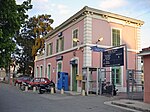Musée international d'Art naïf Anatole Jakovsky
1982 establishments in FranceArt museums and galleries established in 1982European art museum and gallery stubsFrench museum stubsMuseums in Nice ... and 1 more
Naïve art

The Musée international d'Art naïf Anatole Jakovsky (Eng.: Anatole Jakovsky International Museum of Naive Art) is a museum located in Nice, which displays 18-to-21st century works specialized in naive art. The museum was inaugurated on 5 March 1982.
Excerpt from the Wikipedia article Musée international d'Art naïf Anatole Jakovsky (License: CC BY-SA 3.0, Authors, Images).Musée international d'Art naïf Anatole Jakovsky
Avenue du Val Marie, Nice Fabron
Geographical coordinates (GPS) Address Phone number Nearby Places Show on map
Geographical coordinates (GPS)
| Latitude | Longitude |
|---|---|
| N 43.686111111111 ° | E 7.2327777777778 ° |
Address
Musée international d'art naïf Anatole Jakovsky
Avenue du Val Marie
06206 Nice, Fabron
Provence-Alpes-Côte d'Azur, France
Open on Google Maps








